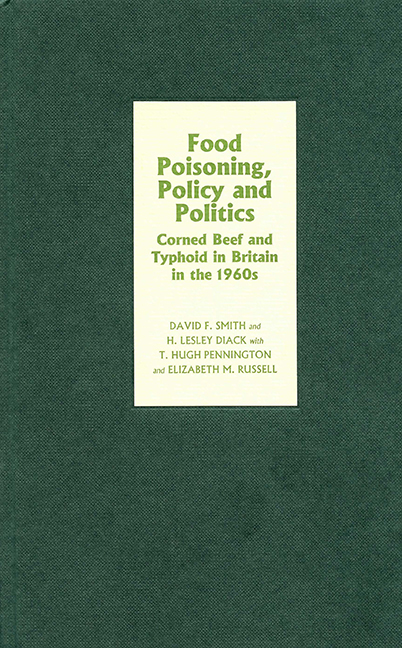Book contents
- Frontmatter
- Contents
- List of illustrations
- Preface and acknowledgements
- Abbreviations used in text
- Abbreviations used in footnotes
- 1 The earlier history of typhoid and food poisoning
- 2 The 1963 corned beef-associated typhoid outbreaks in Harlow, South Shields and Bedford
- 3 The Aberdeen typhoid outbreak
- 4 The medical officer of health, the media and the public in the Aberdeen typhoid outbreak
- 5 Ministers, officials and the Aberdeen typhoid outbreak
- 6 The Milne Committee of Enquiry
- 7 The recommendation on the inspection of overseas meat plants: the roles of existing policy agendas, and interdepartmental and inter-professional tensions
- 8 The disposal of suspect canned meat: the priority of politics over technical advice
- 9 British action to encourage improvements in Argentine meat hygiene, 1964 to 1969
- 10 Summary and conclusions, and food safety since 1964
- Appendix: Recommendations of the Milne Committee
- Bibliography
- Index
1 - The earlier history of typhoid and food poisoning
Published online by Cambridge University Press: 24 October 2017
- Frontmatter
- Contents
- List of illustrations
- Preface and acknowledgements
- Abbreviations used in text
- Abbreviations used in footnotes
- 1 The earlier history of typhoid and food poisoning
- 2 The 1963 corned beef-associated typhoid outbreaks in Harlow, South Shields and Bedford
- 3 The Aberdeen typhoid outbreak
- 4 The medical officer of health, the media and the public in the Aberdeen typhoid outbreak
- 5 Ministers, officials and the Aberdeen typhoid outbreak
- 6 The Milne Committee of Enquiry
- 7 The recommendation on the inspection of overseas meat plants: the roles of existing policy agendas, and interdepartmental and inter-professional tensions
- 8 The disposal of suspect canned meat: the priority of politics over technical advice
- 9 British action to encourage improvements in Argentine meat hygiene, 1964 to 1969
- 10 Summary and conclusions, and food safety since 1964
- Appendix: Recommendations of the Milne Committee
- Bibliography
- Index
Summary
Introduction
Through an exploration of the Aberdeen typhoid outbreak of 1964, and three smaller outbreaks in England in 1963, and related episodes, this book aims to provide insights of potential relevance to matters of current worldwide public, political and medical concern: food poisoning and food safety. In all four incidents, the source of infection was traced to corned beef contaminated during manufacture in Argentina. The handling of the outbreaks, the conduct of the enquiry that followed and its consequences, the disposal of the suspect corned beef, and action in Argentina, together provide a window on the complex processes of food safety policy making.
The notion that historical enquiry might illuminate issues of relevance to current concerns in food and nutrition is by no means original. Food policy making has long been extraordinarily difficult and contentious, in view of the plethora of interests and experts involved. Controversy about the claims and implications of the ‘newer knowledge of nutrition’ (the discovery of vitamins) during the ‘hungry thirties’ also stimulated the study of history. Vitamin pioneer Professor Jack Drummond, who was to become wartime chief scientific adviser at the Ministry of Food, started work on a project published at the end of the decade as the classic of food history, The Englishman's Food. During the 1960s, in a different context, John Yudkin, first professor of nutrition in Britain, turned to history when faced with scientific controversy (over the role of diet in heart disease) and definitional and practical problems. (What constituted the ‘science of nutrition’ and its application?) Yudkin's initiative, the ‘historians’ and nutritionists’ seminar’ at the nutrition department of Queen Elizabeth (later King's) College, London University, met regularly for three decades. It led to three volumes of papers, but attempted no synthesis, the third volume inviting the reader to make connections between the diverse topics discussed. Another example of historian–nutritionist collaboration was a conference of the Society for Social History of Medicine organised by the Wellcome Unit for the History of Medicine and the Nutrition Department of Glasgow University in 1993. A sequel to the latter event took place at Aberdeen University in 1999.
- Type
- Chapter
- Information
- Food Poisoning, Policy and PoliticsCorned Beef and Typhoid in Britain in the 1960s, pp. 1 - 37Publisher: Boydell & BrewerPrint publication year: 2005

